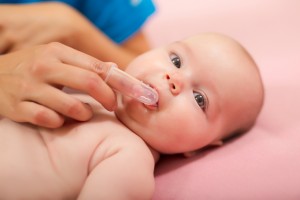 A healthy mouth is important for people of all ages, but it is especially critical for babies and young children. Early Childhood Caries (ECC) is also known as childhood dental decay and bottle-fed tooth decay. The Journal of Natural Science, Biology and Medicine explains how dental decay in young children begins and how feeding practices and socio-economic factors can contribute to what the American Dental Association refers to as “an infectious disease.” Their reports also give recommendations on how to maintain good oral health for babies and how to prevent early childhood caries.
A healthy mouth is important for people of all ages, but it is especially critical for babies and young children. Early Childhood Caries (ECC) is also known as childhood dental decay and bottle-fed tooth decay. The Journal of Natural Science, Biology and Medicine explains how dental decay in young children begins and how feeding practices and socio-economic factors can contribute to what the American Dental Association refers to as “an infectious disease.” Their reports also give recommendations on how to maintain good oral health for babies and how to prevent early childhood caries.
What Causes Tooth Decay in Children?
As with adults, tooth decay in a baby occurs when their mouth becomes infected with acid-producing bacteria. This acid then attacks tooth enamel, breaking down this protective surface. Bacteria can come from various sources, such as sugary juices given before bedtime, a lack of proper dental hygiene and even practices such as dipping a pacifier in juice before placing in a baby’s mouth. Shared saliva between parents or caregivers and the baby, from food or utensils, can also greatly increase the risk of bacteria. Even allowing a baby to put their hand in a parent’s mouth, licking a pacifier to clean it or sharing toothbrushes can transfer bacteria.
What are the Dangers of Early Childhood Caries?
Over time, plaque develops and cavities may form. This can also lead to gum disease (gingivitis) and even more serious issues such as periodontitis, which is the damage of bones that support the teeth. For babies and young children at a critical time in their development, ECC may lead to reduced growth and weight gain, if oral discomfort causes the baby to eat less. A toothache and infection can also adversely affect sleeping habits, which in turn can affect metabolic processes. Studies have found that early tooth loss may lead to problems with speech development, difficulties in school and the loss of self-esteem.
How Can Early Childhood Caries be Prevented?
There are easy steps you can take to greatly reduce the chance of childhood tooth decay. The American Academy of Pediatrics provides a list of recommendations for preventing tooth decay in babies.
- Keep baby’s mouth clean by gently wiping gums with a soft, clean baby washcloth. Once teeth begin to arrive, a baby toothbrush or baby finger toothbrush can be used.
- From 1-3 years, brush children’s teeth using a small amount of fluoride toothpaste.
- Don’t let a baby or child go to bed with food or a bottle. Sugars or carbohydrates left on the teeth is an invitation to bacteria.
- Encourage your child to drink from a cup. This should be done when they’re 12 to 15 months old, as it is less likely for liquid to remain around the teeth when drinking from a cup.
- If child needs to walk around with a sippy cup, fill it with water.
- Limit sticky or sweet foods. This includes items like fruit roll-ups and gummies as well as candy and cookies. Chips and crackers can also contain sugar in addition to carbohydrates.
- Juice is not recommended for babies under 6 months. If juice is served to children from 6 to 12 months, it should be diluted with water and limited to 4 ounces a day. Children 1-6 years old should be limited to 4 to 6 ounces of juice a day, since many juices contain sugar. This also includes the common practice of dipping a pacifier in juice. Don’t do it!
- Do not share utensils, food or drink with babies. Exchanging saliva can transfer bacteria. This also includes licking a pacifier to clean it before giving it to a child.
- Schedule your baby’s first dentist appointment before the age of 1. Early exams and proper dental hygiene will start kids off right for a healthy mouth and excellent overall health that will last a lifetime.







Leave a Reply